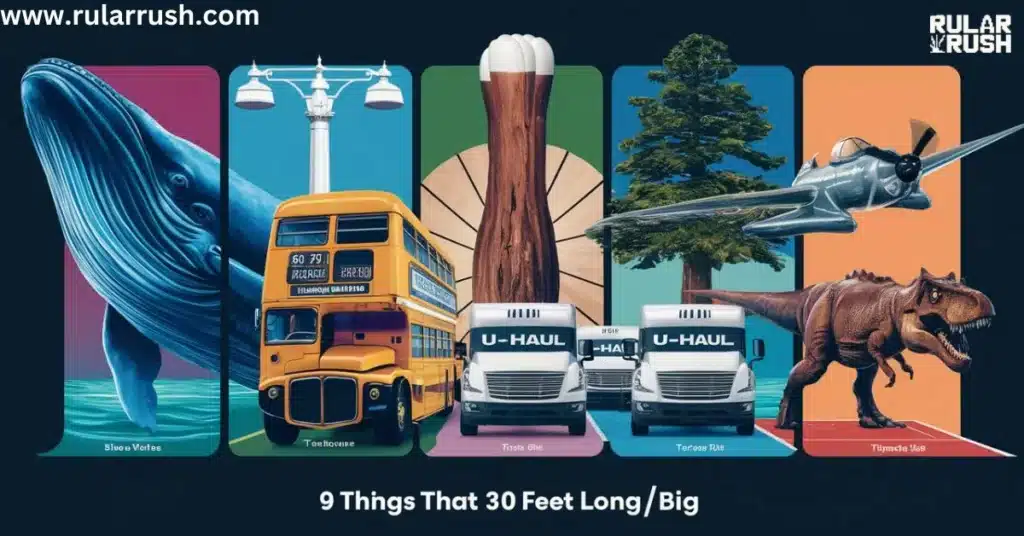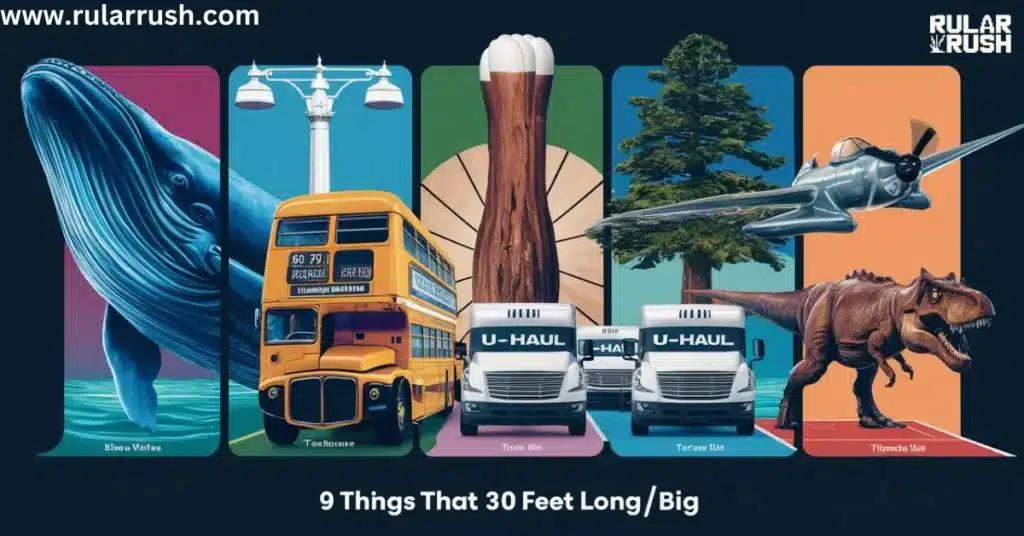
Ever stood next to something and thought, “Whoa, that’s huge!” or “Huh, I thought it’d be bigger”? Welcome to the wild world of things that are 30 feet long! It’s a measurement that’ll blow your mind once you really get it. From the tongue of Earth’s largest animal to the width of where NBA stars make magic happen, 30 feet is everywhere – and nowhere – all at once.
Ready to have your perception of space turned upside down? Buckle up! We’re about to embark on a mind-bending journey through nine jaw-dropping examples that’ll forever change how you see 30 feet visualized. By the time we’re done, you’ll be a pro at eyeballing how long is 30 feet in the real world. Trust us, it’s cooler than you think!
So, whether you’re a curious cat, a trivia buff, or just someone who’s always wondered what 30 feet looks like, stick around. We’re about to unravel the mysteries of this not-so-little length and discover how far is 30 feet in ways you never imagined. Let’s dive in!
The Human Scale: Putting 30 Feet into Perspective
Before we dive into our list, let’s get a handle on what does 30 feet look like in human terms. Picture this: if you’re an average adult, you’re about 5’9″ (1.75m) tall. Now, imagine stacking five of yourself on top of each other – that’s roughly 30 feet visualized!
Here’s a quick breakdown:
- 30 feet = 9.144 meters
- 30 feet = 360 inches
- 30 feet ≈ 5 average adults standing on each other’s shoulders
It’s quite a stretch, isn’t it? Now that we’ve got that visual in mind, let’s explore nine surprising things that measure up to this impressive length.
1. The Majestic Blue Whale’s Tongue
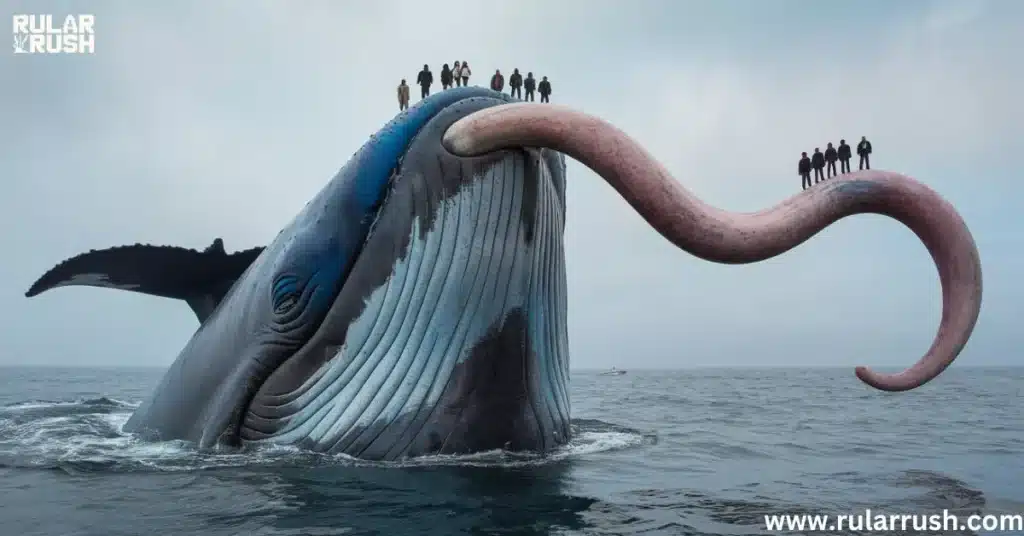
When we think of how long is 30 ft, a whale’s tongue might not be the first thing that comes to mind. But nature has a way of surprising us!
Did you know? The blue whale, the largest animal to have ever existed on Earth, has a tongue that can reach up to 30 feet in length. That’s right – a single organ of this magnificent creature is as long as five humans stacked on top of each other!
Here are some mind-boggling facts about the blue whale and its 30-foot tongue:
- The blue whale’s tongue weighs as much as an elephant (around 5,400 pounds or 2,450 kg).
- Despite its massive size, the blue whale feeds primarily on tiny krill.
- The 30-foot tongue helps create the pressure needed to filter water and trap krill.
| Blue Whale Part | Size Comparison |
|---|---|
| Tongue | 30 feet (9.14 m) |
| Total body length | Up to 100 feet (30.48 m) |
| Heart | About 5 feet (1.5 m) |
Visualizing 30 feet becomes much easier when you imagine it as the length of this incredible organ. It’s a testament to the awe-inspiring scale of nature’s largest creatures.
2. A Towering Telephone Pole

Look up the next time you’re walking down the street, and you might see a 30-foot object hiding in plain sight. Standard utility poles, often referred to as telephone poles, typically stand between 30 and 40 feet tall.
These ubiquitous structures play a crucial role in our daily lives, supporting power lines, telephone cables, and other utilities. But why are they this tall? There are several reasons:
- Safety: The height keeps potentially dangerous electrical wires well above human reach.
- Clearance: It allows for vehicles to pass safely underneath.
- Span: Taller poles can support longer spans between poles, reducing the number needed.
Fun fact: The tallest utility pole in the world stands at a staggering 110 feet (33.5 meters) and is located in Kisarazu, Japan!
When considering how far is 30 feet, utility poles serve as an excellent real-world reference point. They’re a common sight that can help you visualize this height in your everyday environment.
3. The Iconic London Double-Decker Bus

When you think of London, what comes to mind? Big Ben? The Tower Bridge? For many, it’s the classic red double-decker bus. These iconic vehicles are not just a symbol of the city, but also a perfect example of what does 30 feet look like in length.
The standard London double-decker bus measures approximately 31.5 feet (9.6 meters) in length. That’s just a tad over our 30-foot mark, making it an excellent reference point for visualizing this length.
Here are some interesting tidbits about these 30-foot-long vehicles:
- The first double-decker bus in London was introduced in 1829.
- Modern double-deckers can carry up to 87 passengers.
- The compact length allows these buses to navigate London’s narrow, winding streets.
| Double-Decker Bus Dimensions | Measurement |
|---|---|
| Length | 31.5 feet (9.6 m) |
| Width | 8.3 feet (2.52 m) |
| Height | 14.8 feet (4.52 m) |
Next time you’re trying to envision how long is 30 ft, just picture one of these red giants cruising down the streets of London!
4. Half a Regulation Bowling Lane

Bowling is a popular pastime enjoyed by millions worldwide. But have you ever stopped to consider the length of a bowling lane? A regulation bowling lane is exactly 60 feet long from the foul line to the center of the headpin. This means that half a bowling lane is precisely 30 feet!
Understanding this 30-foot measurement is crucial for bowlers, as it plays a significant role in their strategy and technique. Here’s why:
- Oil Patterns: The first 30 feet of the lane are typically where the oil is applied, affecting the ball’s movement.
- Break Point: Many bowlers aim to have their ball “break” or start curving around the 30-foot mark.
- Speed Control: Knowing the halfway point helps bowlers gauge their throwing speed and power.
Pro Tip: Many professional bowlers use the 30-foot mark as a key reference point when planning their shots.
To put this into perspective, here’s a breakdown of a bowling lane’s length:
| Section | Length |
|---|---|
| Approach Area | 15 feet (4.57 m) |
| Foul Line to Arrows | 15 feet (4.57 m) |
| Arrows to Pins | 45 feet (13.72 m) |
| Total Lane Length | 60 feet (18.29 m) |
Next time you’re at the bowling alley, take a moment to appreciate that you’re looking at two 30-foot sections laid end to end!
5. The Height of a Mature Coast Redwood Sapling
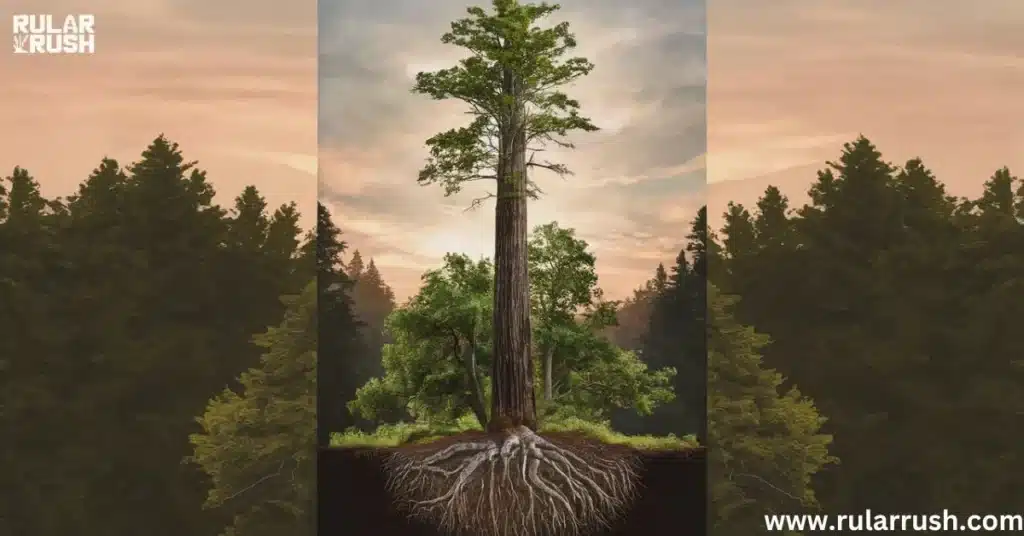
When we think of Coast Redwoods, we often picture the towering giants that can reach heights of over 380 feet (115 meters). But did you know that a 10-15 year old Coast Redwood sapling is typically around 30 feet tall?
This 30-foot milestone in a redwood’s life is fascinating for several reasons:
- Rapid Growth: In just a decade, these trees can reach the height of a three-story building.
- Adolescence: At 30 feet, the redwood is entering its adolescent stage, with centuries of growth ahead.
- Ecosystem Impact: Even at this “young” height, the tree is already providing habitat for various species.
Here’s a comparison of redwood heights at different ages:
| Age | Approximate Height |
|---|---|
| 10-15 years | 30 feet (9.14 m) |
| 50 years | 65-100 feet (20-30 m) |
| 100 years | 150-200 feet (45-60 m) |
| 500+ years | 300-380 feet (90-115 m) |
Interesting Fact: Coast Redwoods can grow up to 3 feet per year during their first 20 years of life!
Visualizing 30 feet becomes much easier when you think of it as the height of a teenage redwood. It’s a powerful reminder of the incredible growth potential these majestic trees possess.
6. Three Standard U-Haul Trucks

When it comes to moving day, many of us turn to rental trucks to transport our belongings. U-Haul, one of the most recognizable names in moving truck rentals, offers a 10-foot truck as one of their standard options. Now, imagine three of these trucks parked bumper to bumper – that’s 30 feet visualized!
Here’s why this comparison is particularly useful:
- Relatable Scale: Many people have experience with or have seen these trucks, making it easy to visualize.
- Practical Application: It helps in estimating space needs for moving or storage.
- Urban Planning: It provides a reference for parking space requirements.
Let’s break down the dimensions of a 10-foot U-Haul truck:
| Dimension | Measurement |
|---|---|
| Length | 10 feet (3.05 m) |
| Width | 6’5″ (1.98 m) |
| Height | 7’1″ (2.13 m) |
| Volume | 402 cubic feet |
Pro Tip: A 10-foot U-Haul truck is typically suitable for a studio or one-bedroom apartment move. So, 30 feet of truck space (three 10-foot trucks) could potentially handle a move from a larger 3-4 bedroom home!
This comparison not only helps in visualizing how long is 30 feet but also provides a practical reference for anyone planning a move or estimating storage needs.
7. The Wingspan of a U-2 Spy Plane
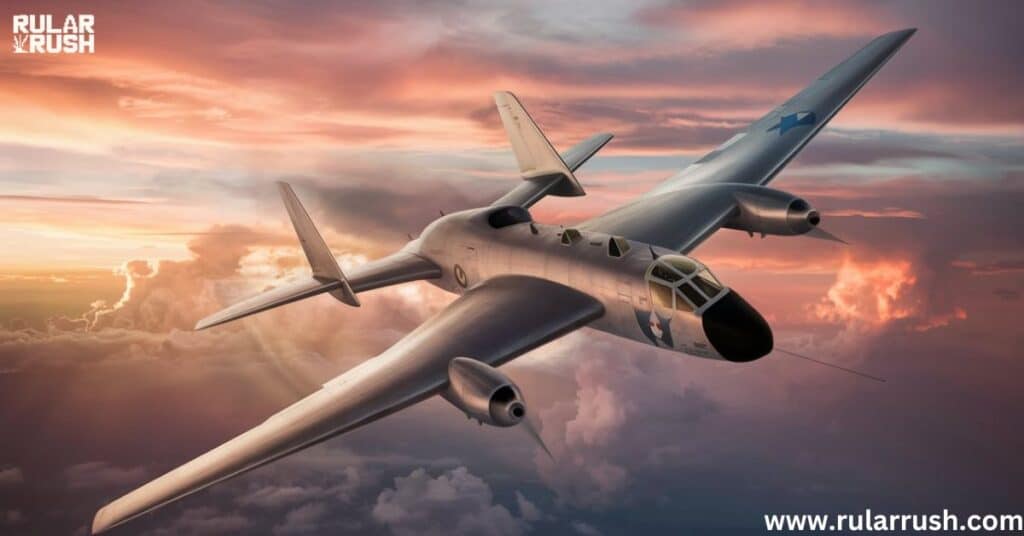
When we think of aircraft, we often imagine massive jumbo jets with wingspans over 200 feet. But the U-2 spy plane, a high-altitude reconnaissance aircraft, has a wingspan of just over 30 feet (103 feet or 31.4 meters, to be exact).
This compact design is crucial for the U-2’s mission. Here’s why:
- Maneuverability: The shorter wingspan allows for better handling at extreme altitudes.
- Stealth: A smaller profile makes the aircraft harder to detect.
- Efficiency: The design maximizes lift while minimizing drag, perfect for high-altitude flight.
Let’s compare the U-2’s wingspan to some other well-known aircraft:
| Aircraft | Wingspan |
|---|---|
| U-2 Spy Plane | 103 feet (31.4 m) |
| Boeing 737 | 117 feet (35.9 m) |
| F-16 Fighter Jet | 32.8 feet (10 m) |
| Wright Brothers’ First Plane | 40.3 feet (12.3 m) |
Historical Note: The U-2 played a significant role during the Cold War, providing crucial intelligence through high-altitude reconnaissance missions.
Visualizing how far is 30 feet becomes quite interesting when you consider it in the context of aviation. The U-2’s wingspan, just slightly over 30 feet, showcases how compact yet effective aircraft design can be.
8. A Tyrannosaurus Rex from Nose to Tail
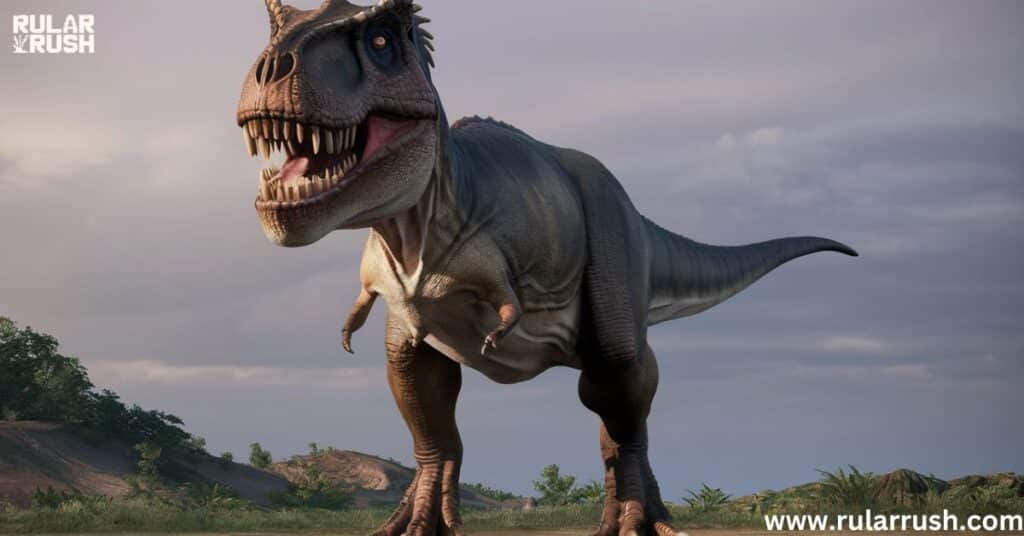
Stepping back in time about 68 million years, we encounter one of the most fearsome predators to ever walk the Earth – the Tyrannosaurus Rex. This iconic dinosaur measured between 30 to 40 feet (9 to 12 meters) from nose to tail, making it a perfect addition to our list of 30-foot wonders.
Here are some fascinating T-Rex facts that relate to its size:
- Bite Force: Its 30-foot length contributed to a bite force of up to 12,800 pounds, the strongest of any terrestrial animal ever.
- Speed: Despite its size, T-Rex could run at speeds up to 20 mph (32 km/h).
- Weight: An adult T-Rex weighed between 5.5 and 9 tons.
Let’s compare T-Rex to some modern animals:
| Animal | Length |
|---|---|
| Tyrannosaurus Rex | 30-40 feet (9-12 m) |
| African Elephant | Up to 24 feet (7.3 m) |
| Great White Shark | Up to 20 feet (6 m) |
| Saltwater Crocodile | Up to 23 feet (7 m) |
Interesting Fact: Despite its impressive 30-foot length, T-Rex had surprisingly small arms, measuring only about 3 feet (1 meter) long.
Visualizing what 30 feet looks like becomes much more exciting when you imagine it as the length of one of history’s most famous predators. It’s a vivid reminder of the incredible diversity of life that has existed on our planet.
9. The Width of a Professional Basketball Court
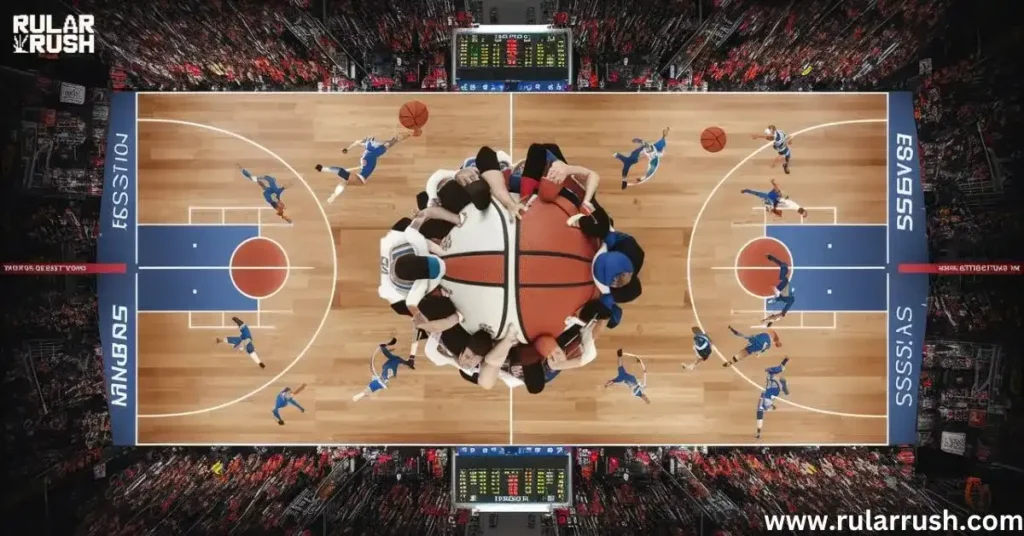
Our final 30-foot example brings us to the world of sports. A standard NBA basketball court is exactly 50 feet wide and 94 feet long. This means that the width of the court is 30 feet from sideline to sideline!
This 30-foot width is crucial to the game of basketball for several reasons:
- Player Spacing: It provides enough room for strategic player positioning and movement.
- Three-Point Line: The width affects the arc of the three-point line.
- Fast Breaks: The court width influences the speed and dynamics of fast break plays.
Let’s compare basketball court dimensions to other popular sports:
| Sport | Field/Court Width |
|---|---|
| Basketball (NBA) | 50 feet (15.24 m) |
| American Football | 160 feet (48.8 m) |
| Soccer | 210-240 feet (64-75 m) |
| Tennis (Singles) | 27 feet (8.23 m) |
Fun Fact: The three-point line in the NBA is 23.75 feet from the center of the basket, except in the corners where it’s 22 feet. This creates a unique arc within the 30-foot width of the court.
Understanding that half the width of a basketball court represents 30 feet gives sports fans a readily available reference point for this length. Next time you’re watching a game, try to visualize how long is 30 ft and how this measurement impacts the flow and strategy of the game!
Practical Applications of Understanding 30 Feet
Now that we’ve explored nine fascinating examples of 30-foot measurements, let’s consider how this knowledge can be practically applied in everyday life:
- Home Improvement: Knowing what does 30 feet look like can help in planning room layouts, garden designs, or estimating material needs for projects.
- Parking and Driving: Understanding the length of your vehicle in relation to 30 feet can assist in parallel parking or judging distances while driving.
- Safety Considerations:
- Pool Safety: Many states require a fence around pools deeper than 30 inches. Knowing how far is 30 feet can help in proper pool area planning.
- Ladder Placement: OSHA guidelines state that fixed ladders over 30 feet high must have fall protection.
- Exercise and Fitness: Many fitness tests or workouts involve 30-foot distances. Visualizing this length can help in setting up home workout spaces.
- Event Planning: Whether you’re setting up for a party or planning a small concert, knowing how to eyeball 30 feet can be incredibly useful for space management.
Conclusion: The Power of Perspective
As we’ve journeyed through these nine examples, from the tongue of a blue whale to the width of a basketball court, we’ve gained a new appreciation for the 30-foot measurement. This exploration has shown us that 30 feet visualized can represent vastly different things depending on the context.
Whether it’s the height of a young redwood tree reaching for the sky, the length of three U-Haul trucks lined up for a big move, or the imposing size of a T-Rex, 30 feet plays a significant role in both the natural world and human-made structures.
The next time you hear someone mention “30 feet,” you’ll have a rich mental library of comparisons to draw from. This understanding not only enhances our spatial awareness but also deepens our appreciation for the world around us.
So, keep your eyes open! You might start noticing how long is 30 ft all around you, from the buildings you pass to the vehicles on the road. Each observation will reinforce your understanding and might just give you a new perspective on the spaces we inhabit.
Remember, in the grand scheme of things, 30 feet might seem small. But as we’ve seen, it’s a length that encompasses incredible diversity, from microscopic krill in a whale’s mouth to the soaring heights of utility poles and redwoods. It’s a testament to the fascinating range of scales that exist in our world.
What 30-foot wonders will you discover in your daily life?
Related Article:https://rularrush.com/common-things-that-are-2-millimeters-mm-long-thick/

Elizabeth is an experienced blogger at “Rular Rush,” specializing in delivering precise and insightful content on various measurement topics. With a passion for simplifying complex concepts, she brings clarity and depth to each post, making technical information easy to understand for readers worldwide.

